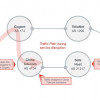Watch Out: Worms are Getting Smarter, Expert Warns
Peer-to-peer networks may be breeding ground for the next generation of nasties
Popular peer-to-peer applications like Napster will quietly nurture the next generation of Internet worms, a computer security consultant says.
Worms, an increasing security problem, replicate themselves and crawl through computer networks to infect any connected PCs. That capability to reproduce and to take advantage of networks makes peer-to-peer setups an ideal breeding ground.
Most worms take advantage of well-known but uncorrected vulnerabilities in software and operating systems to propagate across the Internet, warns Jose Nazario, a biochemistry graduate student and member of a loosely knit group of computer experts known as Crimelabs. He addressed the fifth annual Black Hat Briefings, a security training conference focusing on malicious intruders, here this week.
"Worms are relatively easy to put together," Nazario says. "And once you've released [the worm], it works in an exponential fashion."
Mobility Is Dangerous
Similar to viruses, worms are malicious programs that propagate across PCs carrying a payload of software that lets the worm perform other functions. The payload is the danger, because it may be a Trojan horse (a destructive program disguised as something benign) that could convey information about your system back to its originator. But unlike viruses, Nazario says, "worms are self-propelled. Worms simply execute on their own time scale." Nazario's group calls worms "autonomous intrusion agents."
They're also hard to spot because they don't typically carry an identifiable extension and can look like any type of program. Several recent worms have carried a .vbs extension because they were written in Microsoft Visual Basic. The Anna Kournikova worm, for example, posed as a photo of the tennis star. It was primarily an e-mail clogging nuisance because it automatically sent itself to everyone in each recipient's e-mail address book.
The first widely known worm was released in 1988 by Robert Morris, then a Cornell University student who created the program as an experiment. The Morris Worm, as it is now known, shut down a significant portion of the then-nascent Internet and got Morris expelled from the university.
Dumb Worms Die Out
Most of today's worms are still fairly low-tech. Nazario calls them "primordial soup, where you see that they work like a bunch of unincorporated molecules interacting, but almost can't believe it." He refers to one recent worm as "cobbled together, not even with duct tape, but with Scotch tape."
Current worms are fairly easily controlled, he adds. Their activities prompt lots of attention, Nazario says. They are easily blocked because they repeatedly use the same methods to probe and attack vulnerable target computers. And they're hard to aim at a specific target due to the haphazard nature of their propagation, he adds.
But since the Morris Worm squirmed online, worms have evolved to take advantage of new exploitable vulnerabilities.
"We expect to see a paradigm shift towards more dynamic worms in the next 12 to 18 months," Nazario says.
Those next-generation worms will use popular file-sharing programs like Napster and Gnutella to transmit themselves, Nazario says. He expects the new worms to become increasingly stealthy. As a result, "we'll be seeing online updates and an emphasis on steganography, the embedding of messages inside of other kinds of files like MP3s or pictures, so they can spread somewhat anonymously," Nazario adds.
Smarter Worms Live Longer
New worms will be smarter and have some self-preservation techniques, Nazario says. For example, they will verify the integrity of the source of updates, in order to avoid a "poison injection" of code intended to stop them. Also, they will pace themselves to avoid detection by the large volume of Internet traffic they generate as they spread.
Nazario thinks the next generation of worms may function more like specific organs in a body, with parts performing different functions on different machines, rather than like a single do-everything program.
Nazario's organization Crimelabs is releasing a report on the state and nature of Internet worms next week. But the crux of its message is also Nazario's focus at the event: Worms are only as effective as PC users let them be, and worms will always target the low-hanging fruit: Careless users who leave themselves vulnerable make easy prey.
"We need to keep things up to date, and we suck at that," he adds.









































































